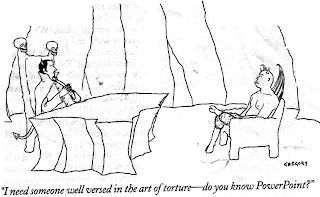
Conferences abound this time of year. Here, a few ways to ensure that your audience will fall asleep and that you’ll somehow miss the invitation list next year.
Read the slides.
Actually, less text is better. Use images, prominent text when needed, and don’t read the slides. Your speaking should supplement the presentation, not repeat it.
Adhere mercilessly to a script.
Sure, you need an agenda and a great topic. But encourage discussion and questions from the audience. They’ll find more value in your presentation if you allow them to help steer the topic and extract information that they’re looking for, but that you might not have planned to include. And allowing time for Q&A is a must - it opens the floor for others to contribute to the conversation.
Focus too much on tech.
Nowadays, everyone is live streaming their presentations with comments from Twitter and questions from Facebook and video and recording podcasts and and… take it easy. Focusing too much on engaging the tech stuff in your presentation can take the focus away from your content, and can distract (and annoy) your audience. If you're moderating a panel, encourage your panelists to keep their tech use to a minimum. If you want to monitor a live forum for questions, get some help from someone who isn't speaking or participating so it doesn't distract from the discussion.
Think that the folks came there for you, not the content.
True, I’ve done my share of going to conferences and attending sessions that had a notable speaker. But it’s a chicken-egg thing. A well-known name isn’t enough to carry a lousy presentation. But a great name can be built - and most of them are - by engaging your audience and giving a killer presentation that’s chock full of great content. Give your audience what they came there to get: great ideas that they can take back to work and put into play, right now.
Forget the follow-through.
The very best presentations are those that are the start to a dialogue and a relationship. If you’re speaking, don’t let your presentation end with the PowerPoint (or Keynote, for my fellow Mac users). Give your audience something great to take home with them, and if you can, get a list of those that attended and thank them for coming with a personal email. Point them to your blog or other places where they can find more information from you, and open the door for more conversation.
All cheeky sarcasm aside, presenting well is a skill that takes time and practice to master. The key is to remember that the people attending your workshop are anxious to find the golden nuggets that they can run back to work with and apply to what they're doing, right now. Focus on the value you're bringing to the discussion, and you'll be a step ahead.
What presentations have left you super excited, or super disappointed, and why? Share in the comments!







No comments:
Post a Comment